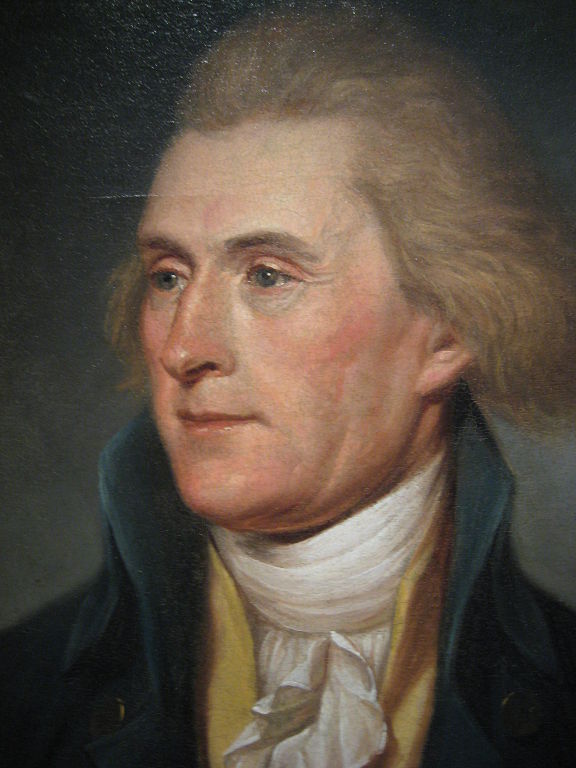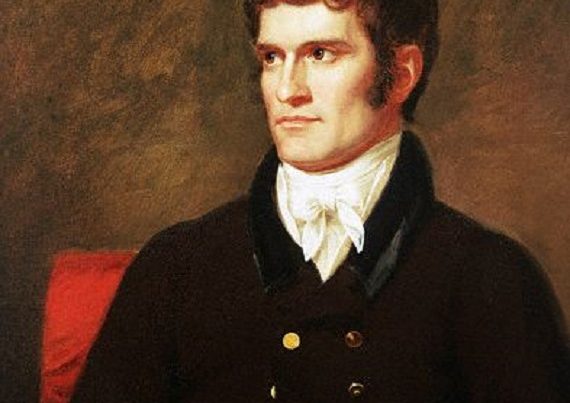Every so often, contemporary opponents of the Jeffersonian tradition make the argument that the legacy of the “Sage of Monticello” has been tainted by patent hypocrisy. The barrage of attacks Jefferson levied against slavery, they suggest, should be discounted on the grounds that he was a slave owner himself. Beyond this, some go as far as to claim that all redeemable facets of Jefferson’s political philosophy and accomplishments of his civil career should be consequently ignored forgotten. Because of his supposedly incongruous position on slavery, the Jeffersonian tradition is sometimes deemed as inconsequential, a mere footnote in history that should be swept under a rug and buried forever.
Despite these erroneous narratives, Thomas Jefferson was deeply opposed to slavery, and the question of freeing his slaves was much more complex and complicated than most assume. While he understood the practice to be indisputably immoral and malevolent, Jefferson was unable to eradicate it in Virginia despite his own earnest efforts.
From his earliest days as a burgess, Jefferson championed legislation that would make it easier for slave owners to independently manumit their own slaves. In 1770, he represented two mulatto boys pro bono, arguing that they had natural rights. Again in 1772, he gave legal representation to George Manly, a son of a free black woman, who had petitioned for freedom after working as an indentured servant beyond his contracted term. Once his freedom was secured, Manly worked at Monticello for Jefferson himself, who paid him wages.
Jefferson’s typical penchant toward slavery was seen yet again on the eve of American independence. At that juncture, he alluded to an episode wherein Virginia made an effort to hinder the slave trade through punitive taxes. In his famous pamphlet, A Summary View of the Rights of British America, Jefferson recalled that the attempt that had been “defeated by his majesty’s negative.” Though the king had put an end to the plan, Jefferson wrote that Virginians had been in favor of the “abolition of domestic slavery.”
In his initial draft of the Declaration of Independence, he condemned the “Christian king of Great Britain” for imposing the slave trade upon Virginia. “He has waged cruel war against human nature itself, violating its most sacred rights of life and liberty…determined to keep open a market where Men should be bought & sold,” he wrote. Although this distaste exemplified a common sentiment in Virginia amongst some of Jefferson’s equally prominent peers, such as George Mason, the language was struck out by the Continental Congress at large. In his 1776 Bill to Prevent the Importation of Slaves in Virginia, Jefferson also made a failed attempt halt the importation of slaves in his own state. Over and over again, he characterized slavery as an abject evil.
Years later Jefferson touched upon slavery years later in Notes on the State of Virginia, the most noteworthy American book of the 18th century. Therein, he doubted the prevailing view that blacks and whites were naturally unequal, and explained that slavery was an affront to God:
“The opinion, that they [slaves] are inferior in the faculties of reason and imagination, must be hazarded with great diffidence…How much more then where it is a faculty, not a substance, we are examining; where it eludes the research of all the senses; where the conditions of its existence are various and variously combined; where the effects of those which are present or absent bid defiance to calculation; let me add too, as a circumstance of great tenderness, where our conclusion would degrade a whole race of men from the rank in the scale of beings which their Creator may perhaps have given them. I advance it therefore as a suspicion only, that the blacks, whether originally a distinct race, or made distinct by time and circumstances, are inferior to the whites in the endowments both of body and mind.”
Without stopping there, he insisted that “nothing is more certainly written in the book of fate than that these people are to be free,” and warned those who claimed otherwise that God’s “justice cannot sleep forever.”
Although several anti-Jefferson academics such as Paul Finkelman and Michael Zuckerman have denounced the man for his views on slavery, most of their accounts rely on lauding certain writings in isolation from those of more crucial importance, ignoring critical context, and overlooking Jefferson’s efforts to bring his sentiments to fruition. Finkelman has even gone as far as to assert that Jefferson had committed “treason against the hopes of the world” by not manumitting his slaves. By omitting any mention of Jefferson’s work to threaten and undermine the institution, and neglecting relevant circumstances, many like Finkelman have done a disservice to scholars and the general public.
In reality, Jefferson’s disposition on slavery was hardly limited to idle words. He took these leanings into account and made a candid attempt to infuse his vision into Virginia society. This was best seen in his response to the defeat of his 1786 proposal for a gradual manumission act for his home state, where he wrote angrily that man was an “incomprehensible machine” that had afflicted “on his fellow men a bondage, one hour of which is fraught with more misery than ages of that which he rose in rebellion to oppose.” Jefferson went as far as to empathize with what he saw as a maligned race of people, who would one day be delivered from bondage:
“When the measure of their tears shall be full, when their groans shall have involved heaven itself in darkness, doubtless a god of justice will awaken to their distress, and by diffusing light and liberality among their oppressors, or at length by his exterminating thunder, manifest his attention to the things of this world, and that they are not left to the guidance of blind fatality.”
The defeat of the bill had made the great purveyor of American liberty apoplectic. Because he so sincerely believed that slaves were destined to be freed, Jefferson’s futile effort to curtail slavery weighed on him, and convinced him that such undertakings posed an incredible challenge. He considered slavery an abomination, but sadly came to the realization that no single man in his own generation held the sole answer to the existential problem. However, his quest to impede the industry did not end there.
Jefferson’s most significant assault against slavery may have come in 1807, when his presidential administration ended the international slave trade forever. During his second term in office, Jefferson finally had the chance to bring his penchants to fruition. Article I, Section 9 of the Constitution allowed Congress to ban the international slave trade after a period of 20 years. Consequently, in his annual message to Congress in 1806, Jefferson used the opportunity to urge Congress to criminalize the international slave trade at the soonest opportunity:
“I congratulate you, fellow-citizens, on the approach of the period at which you may interpose your authority constitutionally, to withdraw the citizens of the United States from all further participation in those violations of human rights which have been so long continued on the unoffending inhabitants of Africa, and which the morality, the reputation, and the best interests of our country, have long been eager to proscribe.”
Congress did just that, and in 1807 responded accordingly by readying legislation for the moment it could be constitutionally enacted. On March 2, the president signed “An Act Prohibiting Importation of Slaves,” effectively abolishing the practice in the United States. Although most of the states by this point had already independently banned the trade in their own states, the law represented a positive step forward for human liberty.
Though he came to the conclusion that free blacks and whites could not live peacefully in the same society, Jefferson honestly pondered and entertained various proposals to make manumission easier in his own state, including dispersal of slaves outside of Virginia’s urban centers and foreign colonization. Underlying each consideration was a conscious effort to help bring about what he believed the “book of fate” would someday yield – the manumission of all slaves.
As historian Kevin Gutzman put it in Thomas Jefferson: Revolutionary, the frequent allegation that Jefferson sat by idly while slaves suffered is a mistaken charge. “Jefferson did not do nothing about the plight of enslaved blacks in America,” wrote the author. Contrary to the common myths and accusations of hypocrisy, he “did not passively accept that slaves would remain slaves in Virginia forever, or even that there would be slavery in America.”
Through his public life, Jefferson maintained that blacks were equally entitled to self-government, and were imbued by their creator with inalienable rights. Jefferson’s anti-slavery streak was remarkably consistent throughout his life, although he will never be given adequate credit for it. Although Jefferson’s actual views are often obscured by trends of presentism, his perspective on slavery was radically liberal for his time and place.
Jefferson owned dozens of slaves, no doubt – no one disputes this, and pointing it out isn’t a stunning revelation. Freeing his slaves, however, created a more problematic quandary than many realize. Lavish spending was Jefferson’s chief folly, a habit that made manumission of his slaves financially impossible. Compounding this was Jefferson’s agreement to extend a huge amount of credit to a close friend, Wilson Cary Nicholas, who unpredictably went bankrupt and died before repayment. As the grandson of the famous Virginian statesmen wrote, the financial calamity became “a perfect hell of trouble.”
Although there is great evidence to suggest that he planned on arranging for the manumission of his slaves, the debt catastrophe emphatically prevented Jefferson from doing so. Any plan to do so after this point would have saddled even more onerous debt onto Jefferson’s living descendants, which he understandably was unwilling to do. He was only able to free the children of Sally Hemings, abiding by a promise he made to her earlier in life. In the end, Jefferson’s grandson was forced to sell Monticello within a few years. All of this is not to excuse Jefferson’s unsound spending habits, quite to the contrary – but these circumstances stand nonetheless as realities that require sincere consideration. If he did free his slaves and load his posterity with burdensome debt, we may instead be complaining today that Jefferson was “anti-family.”
All of these things taken into account reveal that the subject itself was a far more tricky matter. No one gets accolades for opposing 18th and 19th century slavery in 2017, and grappling with the issue in antebellum Virginia was a much more intricate matter. For a Virginian who effectively inherited slaves at birth, and were thus responsible for protecting the financial interests of an entire family as the oldest son, manumission wasn’t always an easy prospect.
Although George Washington and John Randolph of Roanoke were wiser financially and could afford to free all of their slaves, Jefferson could not. Nonetheless, all had virtually the same negative outlook toward the practice, and all should be commended because of it. It was those perceptions, not those of the common caricatures, which actually characterized the southern gentry’s position on slavery.







